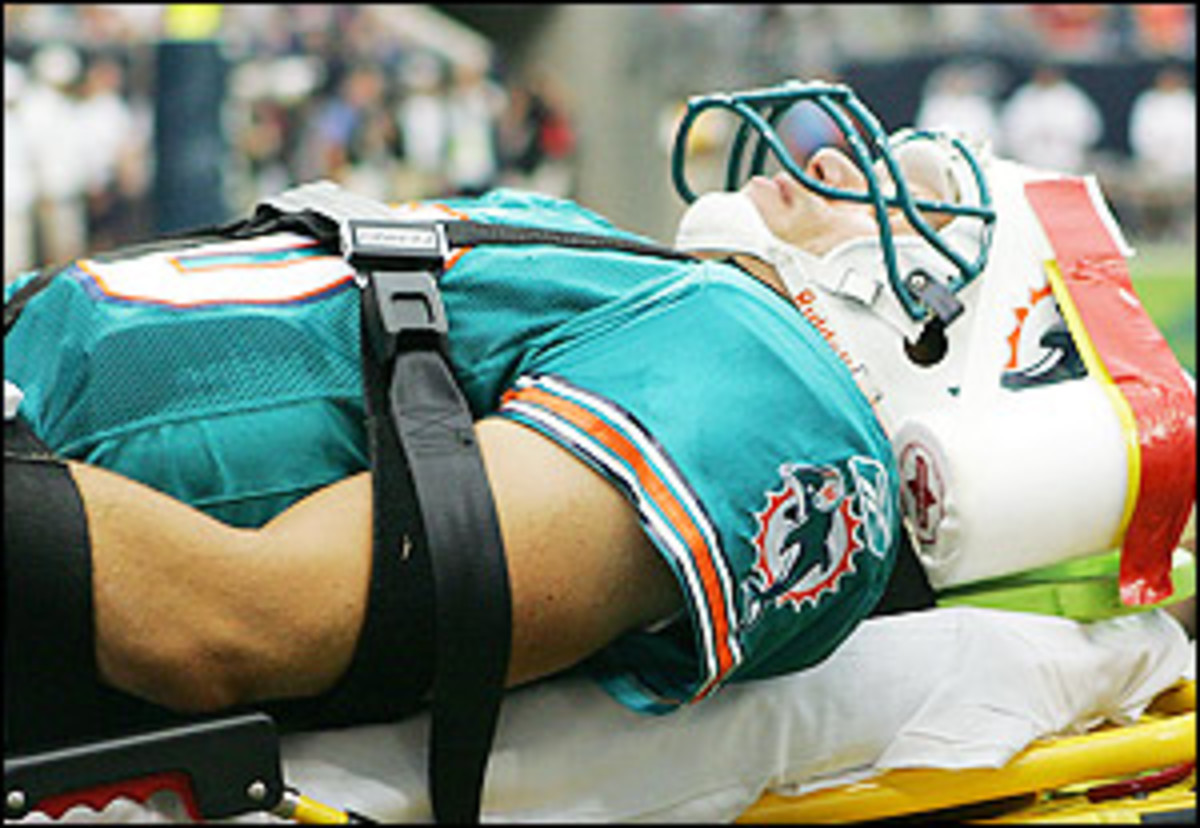Head strong
Trent Green does not want his final moment in the NFL to be the image of him fastened to a yellow stretcher, his body rigid beneath black straps, his hands clasped together as if in prayer.
A professional athlete pictures a different ending -- a trophy, a parting gift, a sunset, maybe -- but the 37-year-old Green could be in his final days as a quarterback after sustaining his second severe concussion in 13 months on Oct. 7 against Houston.
Green's instinct may be telling him to fight, but the issue of head trauma in the NFL is a serious one.
For decades, head injuries and their aftermath were simply viewed as part of the game. You got your bell rung, you saw stars, you went back in the huddle.
Even recently players have worked the angles to get back on the field.
Peyton Manning told the story four years ago of taking a neuropsychological test as a rookie in 1998. He was asked to memorize as many words as he could and then to record them on a separate page.
His score would then be stored away until he sustained a concussion, at which time he would take the test again and the results would be compared with his original test to help gauge the extent of the injury.
"I remember thinking, 'If I'm ever going to have to do this test again, I'm going to do it poorly the first time because I don't want to get taken out of a game,'" Manning said. "I remember kind of faking it."
Earlier this year, retired Patriots linebacker Ted Johnson told the New York Times and the Boston Globe that he believed Bill Belichick, in 2002, went against the recommendation of the team trainer and submitted Johnson to full contact drills four days after he sustained a concussion. Johnson said the fear of losing his job kept him from sitting himself out. He said he sustained another concussion in that practice.
Johnson's neurologist said the linebacker in retirement is dealing with postconcussion symptoms --depression, memory loss and excessive drowsiness. (Belichick told the BostonGlobe, "If Ted felt so strongly that he didn't feel he was ready to practice with us, he should have told me.")
The league recently has tried to take some of the decision-making out of the hands of players and coaches, recommending in August that players knocked unconscious not return to the same game or practice. But even here the lines are blurry. Last month, Jon Kitna sustained a concussion against Minnesota and returned to the game two quarters later.
In some ways, Green's situation has come to mirror those of Steve Young and Troy Aikman, two quarterbacks who dealt with concussions late in their careers that ultimately forced them from the game. During his final season in 1999, Young spoke openly about "the mystery" of concussions as he struggled through symptoms of headaches and nausea after his fourth concussion in three years.
The head injuries were taking a toll on his body and, after much deliberation, he walked away.
For Green, the decision to retire may be even more difficult. Injuries have cost him at various points in his career. A knee injury with the Rams in the 1999 preseason led to KurtWarner's Super Bowl winning season. Last season in Kansas City, a severe concussion in the season opener cost Green eight games.
And then came his latest injury, earlier this month when Green's head crashed into the knee of Texans defensive tackle Travis Johnson, leaving Green crumpled and face down on the field.
As Green waits for medical clearance to return, he has already indicated he wants to play again, even as some have called for his retirement. His instinct to resume his career is natural. Green, like so many athletes, rose to the top of his profession in the face of naysayers and obstacles.
But there are also questions about his quality of life that he must face.
"I'm sure he will sit down with Julie and talk about all of the options," Redskins quarterback Mark Brunell said Wednesday, referring to Green's wife. "You just don't want to get into a situation where it affects your long-term health. I'm sure they'll weigh everything."
John Elway retired amid confetti after a Super Bowl victory. Steve Young retired after a concussion in a half-empty stadium in Arizona.
Every football player steps onto the field knowing that he may not leave it the way he wants to.






